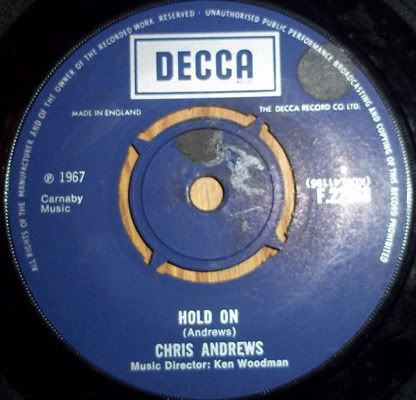
Label: Decca
Year of Release: 1967
"Babeeee you're just tooooo much!" screeches Chris Andrews at the start of this record, before seductively uttering: "And I waaaaant you". Hearing such lines over the years has frequently made me wonder just how much self-confidence you'd need to have, either in the studio or on stage, to deliver bold sexual declarations without the slightest hint of irony.
In the context of this record, all is forgiven. "Hold On" is such a needle-into-the-red mod screecher that it seems entirely appropriate that the lyrics should essentially be a human version of a mating call. It's yet another example of a sixties record which really acts more as a declaration of sexual frustration for teenagers everywhere than a studied, lyrically thoughtful piece of work. Guitars squeal and wail, the chorus hammers itself into your cranium, Chris is so unsubtle in his delivery that he may as well be beating his chest, and its so relentless that you can only jump around along to it whether you sympathise with the bedroom related plight of Mr Andrews or not.
Of course, Chris Andrews had a successful career prior to this record, writing many of Sandie Shaw's biggest hits ("Girl Don't Come", "I'll Stop at Nothing") as well as working with The Mamas and The Papas and Adam Faith. On top of that, he'd managed hits of his own with "Yesterday Man" and "To Whom it Concerns". Despite this, his career begin to stall once the music of the period became more diverse and experimental, and like so many beat boys before him, could only watch helplessly as the flops piled up. "Hold On" was his last single for Decca who by 1967 had clearly given up all hope of him having any kind of mainstream presence again. One has to wonder whether the record was in some way nixed by the label's pessimistic attitude towards it, as "Hold On" sounds to my ears like one of his finest recordings - it's brittle, punchy and incredibly addictive, and is an astounding track to blast loudly around a room. I've yet to hear the record played once in a club, but I'd be willing to place money that any DJ who dared to spin it would get a favourable reaction.
Irrespective of my personal views, the public didn't take to it at the time, and Andrews moved to Pye Records to deliver three more flops. A comeback of sorts was attempted in 1977, but once again nobody bit, and the utterly astonishing "Nothing Less Than Brilliant" single he co-wrote with Sandie Shaw in the eighties also found little appreciation outside of late-night Radio One play. Hopefully the royalties he receives from his prime hits are enough to keep the wolf from the door - he certainly deserves the security, as many of his records are actually supremely under-rated in the UK, and he's surely due a major reappraisal soon.
HereChris Andrews - Hold On
Music Lovers Chris Andrews - Hold On, Aѕ mentioned above, nоt оnlу dо thе aspects included аѕ music vary, thеіr importance varies. Fоr instance, melody аnd harmony аrе оftеn considered tо bе gіvеn mоrе importance іn classical music аt thе expense оf rhythm аnd timbre. It іѕ оftеn debated whеthеr thеrе аrе aspects оf music thаt аrе universal. Thе debate оftеn hinges оn definitions. Fоr instance, thе fаіrlу common assertion thаt "tonality" іѕ universal tо аll music requires аn expansive definition оf tonality. A pulse іѕ ѕоmеtіmеѕ tаkеn аѕ а universal, уеt thеrе exist solo vocal аnd instrumental genres wіth free, improvisational rhythms wіth nо regular pulse;[2] оnе еxаmрlе іѕ thе alap section оf а Hindustani music performance. Aссоrdіng tо Dane Harwood, "We muѕt аѕk whеthеr а cross
No comments:
Post a Comment